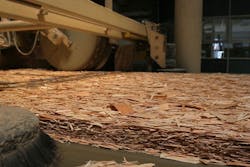EPA toughens rules to reduce formaldehyde exposure from composite wood products
The U.S. Environmental Protection Agency (EPA) recently issued new regulations to reduce exposure to formaldehyde vapors from wood products produced domestically or imported into the United States.
The agency collaborated with the California Air Resources Board to help ensure the final national rule is consistent with California standards. Composite wood products that are sold, supplied, offered for sale, manufactured, or imported in the U.S. will need to be labeled as TSCA Title VI compliant.
These products include: hardwood plywood, medium-density fiberboard, particleboard as well as household and other finished goods containing these products. The EPA is also setting testing requirements to ensure that products comply with those standards, establishing eligibility requirements for third-party certifiers and for accreditation bodies.
Exposure to formaldehyde can cause adverse health effects including eye, nose, and throat irritation, other respiratory symptoms, and cancer.
